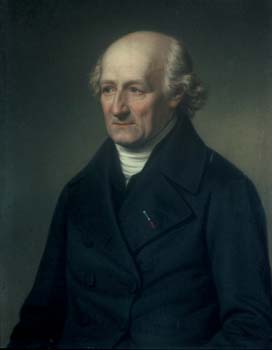Georg Wilhelm Friedrich Hegel
Georg Wilhelm Friedrich Hegel (August 27, 1770 – November 14, 1831) was a German philosopher and an important figure of German Idealism. He is best known for his contributions to philosophy, particularly his development of the dialectical method and the concept of absolute idealism. Hegel's philosophy has had a profound impact on a wide range of philosophical discussions and theories, influencing not only philosophy but also the fields of history, law, theology, and political science.
Life[edit | edit source]
Georg Wilhelm Friedrich Hegel was born in Stuttgart, Württemberg, in the Holy Roman Empire, to a family of modest means. His education was comprehensive, including studies at the Tübinger Stift (seminary of the Protestant Church in Württemberg), where he became friends with the future philosopher Friedrich Schelling and the poet Friedrich Hölderlin. Hegel's early work was heavily influenced by the writings of Immanuel Kant, and he initially sought to extend Kant's ideas before developing his own philosophical system.
After various educational roles, including a period as a tutor in Bern and Frankfurt, Hegel's academic career began in earnest when he became a professor at the University of Jena. It was here that he published his first major work, the Phenomenology of Spirit (1807). Following the closure of the university due to the Napoleonic Wars, Hegel held positions in Nuremberg, Heidelberg, and finally Berlin, where he was appointed to the chair of philosophy at the University of Berlin in 1818. Hegel continued to develop and refine his philosophical system until his death in 1831 from cholera.
Philosophy[edit | edit source]
Hegel's philosophy is complex and wide-ranging, encompassing a method and a system that sought to explain the development of thought, reality, and history. Central to his philosophy is the concept of the dialectic, a process of thesis, antithesis, and synthesis that Hegel believed underpinned all forms of life and history. This dialectical method was a way of understanding the development and resolution of contradictions within ideas, nature, and society.
One of Hegel's most influential ideas is that of absolute idealism, which posits that reality is the manifestation of an absolute spirit or mind. This contrasts with the materialist view that matter is the fundamental substance of reality. For Hegel, the development of the spirit towards self-awareness and freedom is the ultimate purpose of history, a process that unfolds through the dialectical movement.
Hegel's work on philosophy of history emphasizes the progress of the freedom of the spirit through historical events and the development of societies. His political philosophy is outlined in his work Elements of the Philosophy of Right, where he discusses the nature of freedom, the state, and civil society. Hegel's influence extends to the philosophy of law, where he sees laws as the embodiment of the ethical spirit of a community.
Legacy[edit | edit source]
Hegel's philosophy has been both highly influential and controversial. His ideas have been interpreted in various ways, leading to the development of numerous philosophical movements, including Marxism, existentialism, and post-structuralism. Critics of Hegel have pointed to the perceived obscurity of his prose and the difficulty of his system. Despite these criticisms, Hegel remains a central figure in the history of philosophy, and his work continues to be studied and debated by philosophers, historians, and scholars in related fields.
This article is a philosophy-related stub. You can help WikiMD by expanding it!
Search WikiMD
Ad.Tired of being Overweight? Try W8MD's NYC physician weight loss.
Semaglutide (Ozempic / Wegovy and Tirzepatide (Mounjaro / Zepbound) available. Call 718 946 5500.
Advertise on WikiMD
|
WikiMD's Wellness Encyclopedia |
| Let Food Be Thy Medicine Medicine Thy Food - Hippocrates |
Translate this page: - East Asian
中文,
日本,
한국어,
South Asian
हिन्दी,
தமிழ்,
తెలుగు,
Urdu,
ಕನ್ನಡ,
Southeast Asian
Indonesian,
Vietnamese,
Thai,
မြန်မာဘာသာ,
বাংলা
European
español,
Deutsch,
français,
Greek,
português do Brasil,
polski,
română,
русский,
Nederlands,
norsk,
svenska,
suomi,
Italian
Middle Eastern & African
عربى,
Turkish,
Persian,
Hebrew,
Afrikaans,
isiZulu,
Kiswahili,
Other
Bulgarian,
Hungarian,
Czech,
Swedish,
മലയാളം,
मराठी,
ਪੰਜਾਬੀ,
ગુજરાતી,
Portuguese,
Ukrainian
Medical Disclaimer: WikiMD is not a substitute for professional medical advice. The information on WikiMD is provided as an information resource only, may be incorrect, outdated or misleading, and is not to be used or relied on for any diagnostic or treatment purposes. Please consult your health care provider before making any healthcare decisions or for guidance about a specific medical condition. WikiMD expressly disclaims responsibility, and shall have no liability, for any damages, loss, injury, or liability whatsoever suffered as a result of your reliance on the information contained in this site. By visiting this site you agree to the foregoing terms and conditions, which may from time to time be changed or supplemented by WikiMD. If you do not agree to the foregoing terms and conditions, you should not enter or use this site. See full disclaimer.
Credits:Most images are courtesy of Wikimedia commons, and templates, categories Wikipedia, licensed under CC BY SA or similar.
Contributors: Prab R. Tumpati, MD






